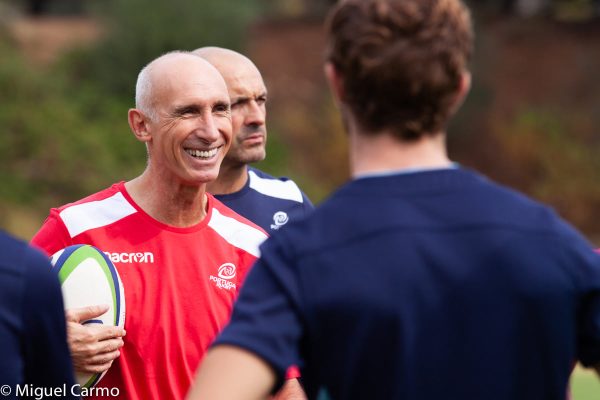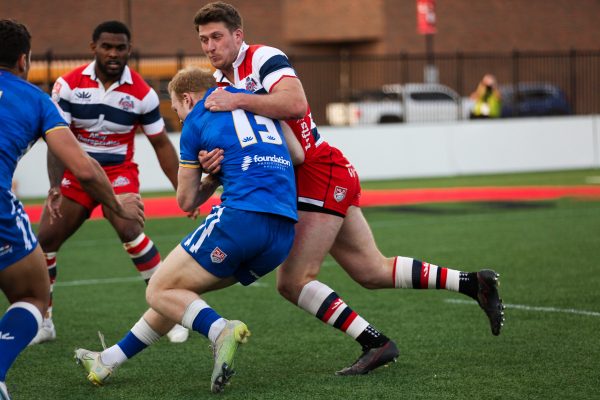Another edition of the men’s Rugby Europe Championship has come to a close, and all eight competing nations will feel that there were more positives than negatives to take “home”.
Georgia took the gold again, as the Lelos beat Portugal in a spectacular Championship final held in the Spanish city of Badajoz. Romania and Spain finished in third and fourth, followed by Netherlands, Germany, Belgium, and Poland, in what was the debut of a new competitive format.
But let’s talk about how the teams that will be in the next Rugby World Cup faired in the competition, and what areas of the game they can still tune up before heading to the biggest stage of them all in September.
🏆 Team of the Championship 🏆
The picks after a hard-fought #REC23 campaign by @francisaac87.
— Rugby Europe (@rugby_europe) April 7, 2023
Georgia: a force that keeps growing
After a tremendous 2022, where they defeated Wales and Italy, the Lelos wanted yet again to ascertain dominance and keep a title they have been holding since 2018. Levan Maisashvili didn’t play around, and selected his best squad from the get-go, defeating Germany, Netherlands, and Spain.
With Shalva Mamukashvili, Giorgi Tsutkiridze (a serious contender for tackler of the year), Tedo Abzhandadze, and Akaki Tabutsadze as the top performers, the Georgian side would defeat Romania in the semi-final, powering through their long-time rivals in a one-sided contest.
As for the final, the title holders survived a Portuguese first-half onslaught to completely steal the show in the last half an hour, marching uncontested to their fifth Rugby Europe Championship title in a row.
🇬🇪 This great try from Akaki Tabutsadze is in contention for Try of the Semi Finals for @GeorgianRugby.
🗳️ See all five tries and vote: https://t.co/bKDoCW93UC pic.twitter.com/cprEor43Ag
— Rugby Europe (@rugby_europe) March 15, 2023
Ok, and what about gameplay-wise? For those who are wondering, and raising questions if Georgia can beat Wales or Fiji come September, the answer is quite clear: yes. The set piece continues to rock and maul any given foe, the different combos planned and executed by the backline are getting sounder and more balanced, and the replacements are as good as the starting line-up, which can step forward to reach new heights on the next World Cup.
Nonetheless, discipline might be the only area that can sometimes spring some problems. Against Portugal, Georgia forced seven penalties in the first half and could’ve dealt a major blow if the Lelos defense wasn’t up to the task. There is still time until the World Cup, and the Black Lion (franchise from the Georgian Rugby Union) is already in South America picking some games, which will help Levan Maisashvili to smooth out the slight indiscipline or raise the tempo around the breakdown.
🇬🇪 v 🇵🇹 | Story of the Final as @GeorgianRugby played @PortugalRugby in the #REC23 in Badajoz. pic.twitter.com/3jm2Rh5haY
— Rugby Europe (@rugby_europe) March 21, 2023
Romania: Unstable in the pack but attack rejoices with life
It wasn’t the best campaign for Romania, as they fell short in the pool stage, defeated by Portugal, and completely bullied by Georgia in the semifinal, finishing in third place after a bruised bronze match against Spain in Badajoz.
Romania felt, in some ways, Andy Robinson’s absence, and had some issues on how to counter the powerful or more skillful packs of Portugal and Georgia, pinned down inside their try-area more times than they wanted.
Eugen Apjok, the man who took the head-coach reins, wasn’t happy with the overall performance, but there were still some very good and optimistic points to be happy about. Two of those were how the attacking patterns and ball flow climbed one level, as they were clearly superior to what we saw in 2021 or 2022.
The Romanian backline, well supported by forwards like Cristi Chirica (the number-eight possesses all the qualities to be a show stealer come to the World Cup), Adrian Motoc, and Alexandru Savin, created some truly good moves, building a series of different and surprising combinations, with Taylor Gontineac, Rouen Normandie’s centre, and Hinckley Vaovasa being two of the most rugby-enticing players in the squad, and the ones who set the games alight.
🇷🇴🤯 Cristi Chirica with the go go gadget arms to intercept and score a beauty for @RugbyRomania! #REC23 pic.twitter.com/2hBb44bAdL
— Rugby Europe (@rugby_europe) March 19, 2023
Romania finished as the team with the most meters ran (2552) and defenders beaten (127), and were third over all teams, with more clean breaks (48) created and successful offloads made (44). Very promising stats before a Rugby World Cup.
The big question and issue are the forward-pack stability, especially when the second half comes, and that (major) detail can be decisive in the future. The Romanian pack lost the scrum battle against Portugal and Georgia, as well as the maul and lineout contest, suffering the same problems versus Spain, who, with a younger squad, made the Oaks sweat.
There’s still time left before the ninth of September (their first match in the World Cup, against Ireland), and every minute will be key to how Apjok and the Romanian staff can make the whole “machine” work better.
Quel effort 🥵
Le centre roumain n’a pas hésité à puiser dans ses dernières ressources pour aller aplatir l’essai ⛽️
🎥 @rugby_europe#REC | #RugbyEurope pic.twitter.com/EYRkdu2Bd5
— RugbyPass FR 🇫🇷 (@RugbyPass_FR) February 23, 2023
Portugal: Lobos continue to grow
From a disappointing fourth-place finish in the Rugby Europe Championship in 2022 – Spain would fall into this spot after the WR’s independent committee decided to punish the Leones -, to a vice-champion status in 2023, Portugal showed clear signs of growth and strong development, and can be a surprise in their Pool C.
Patrice Lagisquet had to be a happy man (see main image) after what the Lobos were able to do in the tournament, as Portugal was able to reach their second-best-ever result/standing in the competition (the best was in 2004 when they won the European Nations Cup), slotting seven uncontested wins between the Rugby World Cup Qualifier and their semifinal against Spain.
Yes, they did lose against Georgia in the Championship match, against a foe they will face off in October, but overall, Portugal managed to improve their set-piece quality, dominating Romania, and surviving a good outing from Spain, while, surprisingly, pushing Georgia back in the last match of the Men’s Rugby Europe Championship.
🇵🇹 EVERY WEEK THEY PLAY⭐️
What a score to get @PortugalRugby back into the contest. #REC23 pic.twitter.com/BrYp4qweyN
— Rugby Europe (@rugby_europe) March 4, 2023
Rodrigo Marta (second-best scorer of the tournament, and the player with more clean breaks, defenders beaten, metres ran, and tackle-busts), Nuno Sousa Guedes, and Tomás Appleton were some of the best in the backline, while José Madeira, David Costa, Nicolás Martins (no tackles missed in his 46 attempts) and Thibault de Freitas were the screws that kept the pack tight, pushing Portugal to achieve excellence.
The Lobos’s biggest problem lies in how the bench can keep the team in fifth gear, mainly in the set-piece, as against Georgia, the bench replacements weren’t able to counter the champions or keep the team’s attacking and defensive stamina up, which would open the flood gates for three uncontested tries in the last 15 minutes.
It is going to be interesting to understand how the Portuguese staff can tune up the team, but one thing we are certain of… their attacking prowess will surely be felt in September.
🇵🇹 v 🇷🇴 | Ohhhhh that's what this @PortugalRugby team is all about!
Wonderful team try, finished with an outrageous dummy by Lucas. #REC23 pic.twitter.com/1qjWP47Gtd
— Rugby Europe (@rugby_europe) February 19, 2023
The Men’s Rugby Europe Championship will come back in 2024, and in this next June/July International window, Georgia, Romania, and Portugal will all begin their training camps to get ready for the biggest stage of them all.
Photo Credit: Miguel Carmo of Federação Portuguesa de Rugby, on October 22, 2020.



